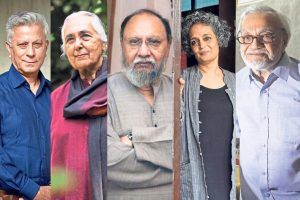Ramin Jahanbegloo in Live Mint:
 Talking about the public role of intellectuals in today’s world, and more specifically in India, is of great significance given changes taking place in culture and politics. It is not simply enough to talk about the role of Indian public intellectuals in the making and preserving of critical mindedness and democratic engagement in Indian academia. One should also pay attention to the role which could and should be played by public intellectuals in promoting moral and political excellence and civic friendship among the future generation of Indians.
Talking about the public role of intellectuals in today’s world, and more specifically in India, is of great significance given changes taking place in culture and politics. It is not simply enough to talk about the role of Indian public intellectuals in the making and preserving of critical mindedness and democratic engagement in Indian academia. One should also pay attention to the role which could and should be played by public intellectuals in promoting moral and political excellence and civic friendship among the future generation of Indians.
However, to do so, public intellectuals in India need to challenge the traditional assumptions that have reinforced positivistic methodologies, apathetic scholarship and an increasing fascination with a calculative leadership which refuses to listen and to learn instead of leading.
Fortunately, many Indian intellectuals—such as Romila Thapar, Ashis Nandy, Dipankar Gupta, Arundhati Roy and Bhiku Parekh—continue to engage with Indian public and strengthen the concepts of democratic dissent and civic questioning. Yet, we should not forget that the notion of critical thinking and the business of questioning, more than being an act of political partisanship, are essential components of the definition of “intellectual” in modern times.
More here.
